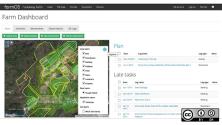Building a business in an open and collaborative way can be a wonderfully rewarding experience, engaging both the members of the organization as well as the customers in a unique relationship based on common, transparent goals, while growing a sense of community around the venture.
Last year, Shaun McCance wrote an article for Opensource.com, 4 tips from growing a community grocery store, where he shared his experiences from the initial steps of building a co-operative (co-op) grocery store in his hometown of Cincinnati, Ohio, applying similar practices that many open source software projects use in software development.
Now, just about one year later, I spoke to Shaun about the state of that co-operative business, successes, lessons learned, and thoughts for the next year.

opensource.com
Where does the project stand today? How do you feel about the general progress of your efforts?
We've made incredible progress. The bulk of the efforts have been focused on raising the $5.6 million required to open the doors. As of right now, the co-op has raised 96.5% of the startup funds. Some of that is from conventional sources like bank loans and distributor advances, but the only reason we've been able to secure conventional funds is because of the $1.55 million we've raised just from people in the community.
There have been a few setbacks. One major funding source we'd budgeted fell through. We had some vocal detractors from people who had other ideas for the best use of the old grocery store. Some of our volunteers (including me) had to scale back their efforts due to other obligations. But we've had an incredible outpouring of support from the community.
People do amazing things when they believe in what they're doing.
In your article, you illustrated some practices in volunteer retention. Which practices did you find helped you achieve your community-building goals? Which practices turned out to be detractors?
I still believe in everything I said a year ago: Know what you're doing and why you're doing it. Empower people to make decisions. Keep the negativity out. Thank people.
Some of these points became real issues. For example, there was a long period of time when we were engaged in very difficult real estate negotiations. Real estate negotiations are difficult to do in the open. You're often bound by nondisclosure agreements, and fully disclosing your finances can hurt your bargaining power. These negotiations took longer than anybody would have liked, and there was a growing discontent from our community because they felt left in the dark. We couldn't even tell our core volunteers everything.
Luckily, those issues went away after the negotiations were finished. In fact, removing the uncertainty of the real estate got people even more excited. Sometimes in circumstances like this, keeping secrets is an unfortunate necessity. But you shouldn't make a habit of it. You can't empower your community if you keep secrets from them.
Many growing open source communities face circumstances that sometimes impact the overall mission or cause of the project. Has the co-op community experienced any major changes since you incorporated? How did you handle discussions and decisions around this?
For about the last year and a half, the message of the co-op has been clear and consistent: Open a community-owned grocery store in the location of our old neighborhood grocer as soon as possible. I firmly believe that this cohesion of purpose has been critical to its ongoing progress.
Early on, there was a lot of discussions and dissent about the best way forward. Should we try to attract a major grocery chain? Should we partner with a developer and be a part of a larger mixed-use space? In the end, we decided we wanted the community to control the grocery store, and that we wanted it open quickly. Not everybody agreed, but the people who did the work made the decisions.
If we conducted another interview this time next year with you, what do you think you'll be sharing with Opensource.com? How do you envision the co-op evolving, growing, or changing in the upcoming year?
By this time next year, I hope to be writing articles while sitting in the cafe at the front of the store, looking out the window at a revitalized business district. The hardest job will be done when the doors are open, but that's not the end of the community that built it.
One of the big advantages that co-ops have is the loyalty that results from community ownership. Ongoing community engagement will be vital to the store's success. There are a lot of things I'd like to see the co-op do once it's open. I'd like it to engage other businesses to create interesting partnerships. I'd like it to find new businesses to fill empty storefronts. I'd like it to help program events and festivals to bring people into the neighborhood.
The co-op is a result of people's love for their neighborhood, and it's exciting to think of what else we might be able to do with the kind of community enthusiasm.






Comments are closed.